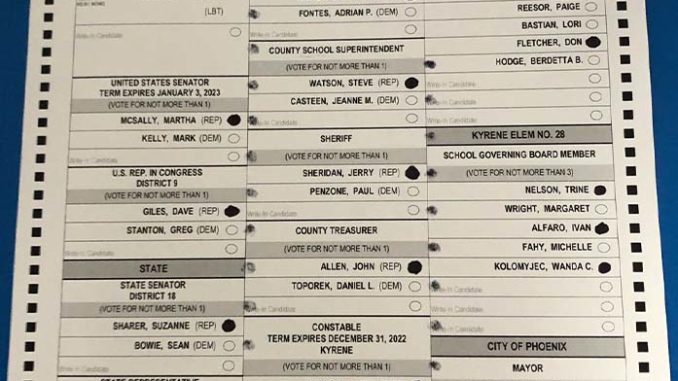
An inspection of 100 of the 27,869 ballots in Maricopa County which went through a duplication process before being tabulated revealed two votes which went uncounted for President Donald Trump, but the chairwoman of the Arizona Republican Party acknowledged the sampling size was too small to draw any conclusions.
During a hearing Wednesday, the Maricopa County Attorney’s Office admitted Trump’s vote count would have been increased by two and former Vice President Joe Biden’s count reduced by one if the two ballots in question had been duplicated correctly. County officials also agreed to make another 2,500 duplicated ballots available for review by GOP chair Kelli Ward and her attorneys.
— Dr. Kelli Ward ?? (@kelliwardaz) December 3, 2020
“We just want to make it clear we just want to help the court if the court needs that information,” Deputy County Attorney Thomas Liddy told Judge Randall Warner. “We’re happy to have people look more closely at it. We’ve got nothing to hide.”
Warner will conduct an evidentiary trial Thursday which he says can be carried over to Friday if more evidence becomes available from the expanded sampling.
On Nov. 24, Ward filed a notice of her intent to initiate an election contest against awarding Arizona’s 11 elector votes to Biden, who received 10,457 more votes than Trump. A formal contest could not be filed until Secretary of State Katie Hobbs certified the state’s election results, which she did Nov. 30 with the participation of Gov. Doug Ducey and Arizona Attorney General Mark Brnovich.
Ward alleges that ballots which had to undergo a duplication process were mishandled in Maricopa County and possibly on a statewide basis. This includes damaged or soiled ballots which are manually recreated by a two-member team onto a new ballots, as well as ballots which were rejected by at least two tabulation machines.
Duplication is also necessary for nearly 10,000 military members and others authorized by federal law to cast their votes in Maricopa County by email under the Uniformed and Overseas Citizens Absentee Voting Act. Those emailed “votes” must be transferred onto a paper ballot by a two-person team comprised of members of different political parties.
Ward’s election challenge names 11 Democrats who have been elected to represent Arizona at the U.S. Electoral College on Dec. 14. The Arizona Secretary of State’s Office and Maricopa County have been granted intervenor status in the case by Warner.
During a Nov. 30 hearing, the judge ordered the parties to provide notice of the proceedings to the Arizona Attorney General’s Office. On Wednesday, the judge expressed surprise by the lack of participation by Brnovich or Ducey.
“There’s not been anybody in this case representing the attorney general’s office or the governor’s office, or the state as a whole,” Warner noted. “And I’m sort of wondering why that is.” None of the parties had an answer for the judge.
According to Ward’s attorney, Jack Wilenchik, one of the 100 duplicated ballots reviewed on Tuesday had Biden’s oval filled in even though the original ballot clearly showed Trump’s oval filled in. A second ballot had Trump’s oval filled in but its duplicate had two ovals filled in – one for Trump and one for Write-In.
This would have caused the tabulation machine to report an overvote as only one oval should have been filled in for the presidential race. An overvote results in none of the candidates being credited with a vote.
Roopali Desai, an attorney for Hobbs, noted a two percent error rate from a sampling of only 100 was “not indictive of pervasive fraud or misconduct” and that errors can go “both ways” as other duplicated ballots may have incorrectly given votes to Trump that were intended for Biden.
However, county officials did not object to making another 2.500 duplicated ballots available. If the larger sampling shows a consistent problem, then the question becomes whether Warner has authority to do anything about it, and if so, what he can do.
Ward had also alleged that Republican observers were denied a sufficient opportunity in Maricopa County to review the verification of signatures on early-ballot envelopes. The ballots inside those envelopes were note forwarded to tabulation if the voters’ signatures could not be verified.
Warner ordered the county to allow handwriting experts to review the signatures on 100 randomly selected early ballot envelopes. The 100 envelopes were made available to Ward’s experts on Tuesday, but the result was inconclusive, according to Wilenchik.
“The result of that analysis appears to be that around eight to ten percent of the mail-in ballots had ‘inconclusive’ matches – which is not to say that the signatures were invalid or fraudulent, simply that that the experts cannot say to a professional standard one way or the other, apparently because there were too few signatures on file,” he told the judge.
Wilenchik told Arizona Daily Independent he has not asked for a larger sampling of signatures.
